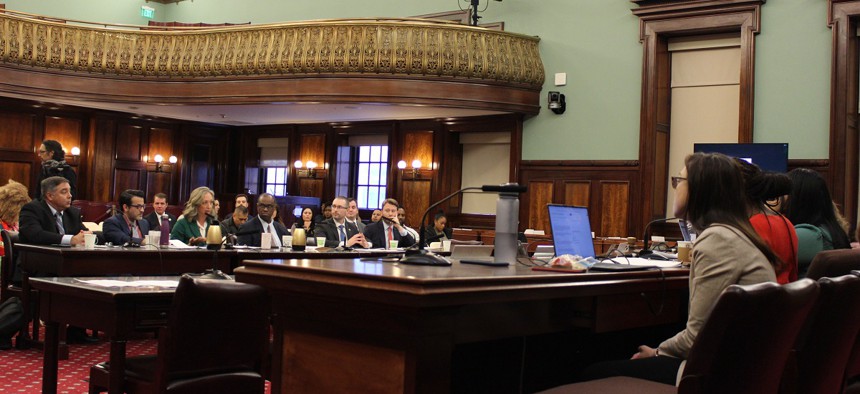Procurement
City Council calls out Adams administration for lacking standardized payment method for meals in shelters
The scrutiny came at an oversight hearing that focused on food procurement for shelters and emergency housing for asylum-seekers

Members of the Adams administration appear before a New York City Council oversight hearing on procurement shelter services Tuesday, Dec. 12, 2023. Ethan Geringer-Sameth
The Adams administration has come under fire for not having a standardized method for making payments for meals in city-run shelters and other settings, despite warning of declining revenue and calling for significant cuts to other city services.
Members of the City Council hammered the administration on the lack of price control even as the administration is seeking billions in cuts to government programs across the city in its November financial plan. New York City spends close to $500 million on food each year, including tens of millions on meals for asylum-seekers. The city has spent $463 million on prime food contracts for asylum-seekers since the number of migrants entering the city began ballooning in 2022, according to the Mayor’s Office of Food Policy.
“Can you help me understand why there are so many different price caps for food spending across all agencies,” asked Council Member Julie Won, chair of the body’s Committee on Contracts, in an oversight hearing Tuesday that focused on food procurement for shelters and emergency housing for asylum-seekers. Won cited examples of city contracts where the price of a per diem meal can range for $3 to $15 for the same fare from the same vendor.
Charles Diamond, an attorney for the Mayor’s Office of Contract Services, said there is no standard across-the-board price-cap for meals but, in the case of emergency contracts, agencies are encouraged to consult with other offices seeking similar goods or services. “The procurement rules are not going to speak to the issue you raised, it’s going to be a question of what the agencies need and how to get it,” Diamond told the Council.
“I would say that we certainly, whenever anything like that is pointed out, want to encourage the agencies to get the most competitive prices possible,” Diamond said. “Certainly the procurement rules do not prevent such.”
“The price for what we get as a prime contract is one thing … if a nonprofit or another entity is then leveraging its subcontracts, they don’t quite have the economies of scale,” added Kate MacKenzie, executive director of the Mayor’s Office of Food Policy. “That might provide some insight into the differences in price point which we are … getting more clarity [on] and line of sight at the hard-to-find, which are the subcontractors.”
Council Member Julie Menin, chair of the Committee on Small Business, which held the hearing jointly with the Committees on Contracts and Economic Development, called the administration’s testimony “incredible.”
“Right now the administration is asking us to accept cuts to education, sanitation, critical services, and yet the administration has a system where you have various agencies using different price points,” Menin said. “Why isn’t the city of New York promising its purchasing power on these contracts to drive the price down?”
Diamond defended the outcome when agencies “use every tool in the toolbox,” as the administration has been encouraging since declaring a state of emergency in 2022 over the influx of asylum-seekers entering the city. That may mean leveraging existing city and intergovernmental contracts but not always. “In other instances, agencies have determined that they have to make one-off procurements for whatever operation needs they may,” Diamond said. “So I would say there are different tools that have been used that will reflect different prices.”
Matt Jozwiak, the founder and CEO of Rethink Food NYC, which runs food procurement for the emergency migrant shelters, known as HERRCs, told the Council he hasn’t observed any formal process for standardizing prices across the city’s food contracts. “It’s been encouraged that we focus on this. There’s been no direct, like, ‘come together and try to drive prices down through group purchasing,’” he said, but the administration has “encouraged collaboration between other food providers.”